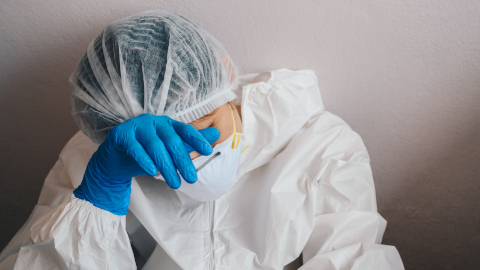Two UAB projects receive funding from the "Fondo Supera Covid-19"

A research team will create tools which rapidly detect vulnerability to post-traumatic stress among healthcare workers exposed to SARS-CoV 2. Another team will focus on guaranteeing that remote working does not reinforce gender inequalities. Both will receive funding from the Fondo Supera Covid-19.
23/07/2020
The Fondo Supera Covid-19, created in April by Banco Santander through its Santander Universities programme, in collaboration with Crue Universidades Españoles and the Spanish National Research Council (CSIC), has decided to fund two of the research studies led by UAB research teams.
The first of these projects is called ES3-PT (Estrès PostTraumàtic), led by Jordi Aguiló, researcher of the Department of Microelectronics and Electronic Systems at the UAB and the CIBER-BBN (Centro de Investigación Biomédica en Red de Bioingeniería, Biomateriales y Nanomedicina). The study aims to offer early detections of stress symptoms among healthcare workers who are directly in contact with Covid-19 patients (nurses, doctors and health assistants), with the aim of avoiding or decreasing the appearance of severe mental disorders, such as post-traumatic stress and depression.
The research team is preparing a specific methodology to help follow the evolution of these individuals, assess the degree of stress symptoms existing and the ability to adapt to the situation and overcome it.
Researchers will adapt and automate stress-measuring tools developed by the UAB-CIBER group: a smart bracelet capable of tracking several physiological symptoms, such as heartbeat, electrodermic activity, skin temperature, etc.; a patentted system which allows assessing levels of stress according to a set of variables obtained after a careful study of these signals and a computer programme named MARIA, which also allows evaluating cognitive responses.
In the project, these advances will be used to evaluate the evolution of healthcare professionals at Hospital de Mar and Hospital Clínic in Barcelona, and Infanta Leonor Hospital in Madrid, towards levels of pathological stress. Trials have begun with over 500 workers and researchers hope to expand their study with the incorporation of other local and international hospitals.
“Somatic medicine includes tools such as electrocardiograms, scanners and glucose measurers, apart from many others, which provide information an specific disorders.Our objective is to use the most advanced technologies available to create tools that are as reliable as the ones I mention, which can help mental health professionals, diagnose, assess, and monitor mental disorders”, explains Jordi Aguiló.
The project's budget is €180,000 and will last one year. The devices developed will also serve in the future to evaluate the vulnerability to stress of other population groups.
The group of researchers working on this project are UAB-CIBER BBN researchers Jordi Aguiló, Esther García Pagès, Thais Ribeiro and Carlos Puig, alongside researchers from the Hospital del Mar-IMIM, the Hospital Clínic and the Universidad Complutense de Madrid.
The UAB-CIBER group, alongside other CIBER groups, dedicated a large part of its efforts to the development, preparation, tessting and validation of clinical trials of tools needed for objective, non-invasive and continuous assessments of mental disorders in general and stress-provoked disorders in particular.
The group thus participated in several national and international projects, such as one led by King’s College for early detection models of severe cases and evolutions of depression, epylepsy, and multiple sclerosis, and another one led by the Hospital of Maastricht on the evaluation and decrease in pre-surgical stress.
Remote Working and Gender Inequality, Beyond the Obvious
The second project, called IGETECO, will analyse the gender impact remote working and lockdown routines have had in order to study the not so visible effects. For example, how the closing of schools and the impossibility of externalising part of the domestic chores and caretaking tasks have affected each gender.
“The study will allow us to design a catalogue of intervention proposals aimed at setting the conditions needed for remote working so that it does not reinforce gender inequalities", explains Sara Moreno, researcher at the Department of Sociology and lead researcher of the project.
The study will analyse aspects such as the change in use and distribution of spaces, time and work within the home where people have worked in during lockdown; self-isolating routines according to the person's life cycle (care of children, care of adults and the elderly, etc.) and professional situations; daily routines when compared to before the pandemic; conseuqences of organising remote working and and lockdown routines and the co-responsibility of employers, as well as daily costs of remote working in terms of social, occupational, economic and health conditions of men and women.
The research team involved in the study is formed by Sara Moreno and Vicent Borràs, both researchers from the Department of Sociology and who work at the Centre for Sociological Studies on Daily Life and Work at the UAB (QUIT), and Sergi Porcel and Irene Cruz, from the Institute of Regional and Metropolitan Studies of Barcelona (IERMB).
To conduct the study, they will focus on a public administration case, through statistical analyses and in-depth interviews. The study will last one year and has a total budget of €36,000.
This information is related to the following SDG
Good health and well-being
Reduced inequalities